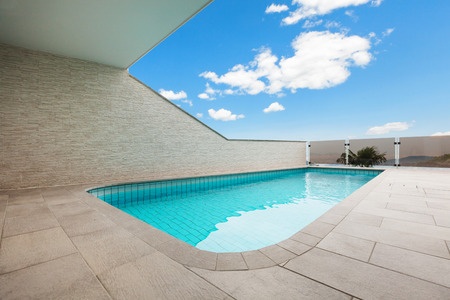How Long Does it Take to Build a Concrete Pool?
Publication date : Monday, February 22nd, 2021
One of the most common questions we hear from customers is, “How long will it take to build my swimming pool?” This is a great question, and knowing the answer will help you plan accordingly.
An average pool takes about 8-12 weeks to complete, though it depends on the type of pool you’re getting. Concrete pools take the longest to build, usually around 3-6 months. Fiberglass and vinyl pools can typically be completed in about 3-6 weeks. Of course, this all depends on the time of the year, the weather, the pool contactor you’re working with and other factors.
Let’s learn more about the process for building a gunite swimming pool in Jackson MS and the timeline to anticipate.
Initial Consultation
When people hear how long it takes to build a swimming pool, they often don’t realize that this is the construction time only. You also need to account for the consultation, creating the initial design, working out all the details and features, selecting materials and finalizing the design.
Also in this stage is permitting. Your pool builder in Jackson has to get the necessary approvals and permits before they can start digging. How long this takes is largely out of their control.
Construction
Once the design is finalized and the permits are ready, the construction phase can start. The weather plays a factor, as digging holes in the mud doesn’t work well. However, you can anticipate 1-2 days for this to be completed. When the excavation is done, your swimming pool contractor will handle the plumbing, electrical and foundation.
When everything is in place, the concrete is poured. It takes about one week to cure the gunite. Once the gunite is set, the tile and coping are installed. Finishing touches include decking, landscaping and water features, depending on what you chose for your pool.
Start Your Pool Project Today
Keep in mind that your pool construction timeline varies depending on many factors. When you contact Paradise Pools for a consultation, we’ll be able to give you a more accurate timeline based on the size and type of pool.
One thing we can safely say is that the earlier you start on your pool, the better. Reputable pool builders have full schedules and you want to make sure your project gets done in time for spring or summer!
Concrete Pools vs Vinyl Liner Pools
Publication date : Thursday, May 10th, 2018

The two main types of inground swimming pools offered at Paradise Pools are concrete (gunite) and vinyl liner. Both structures have pros and cons. Everyone has different priorities, so there is no “best” option. Instead, we explain the advantages and disadvantages and help our customers choose the right option for their budget, expectations and priorities.
Below is the information we share with our customers when they call us for a quote. Together, we can do an honest analysis of concrete and vinyl liner pools to help you make an informed decision.
Customization
- Concrete. Concrete is the better option if you want the most unique swimming pool on the block. It can be designed virtually any way you’d like, including very large or very deep. You can also do fun and creative layouts such as tanning ledges.
- Vinyl liner. There are options to customize the size, shape and depth of a vinyl liner pool, just not as many as with a concrete one. Generally, people choose rectangular shapes.
Installation
- Concrete. You’ll need to schedule a gunite installation way in advance, as it takes roughly 3-6 months to complete.
- Vinyl liner. Most vinyl liner pools take 4-8 weeks to complete. Many of our customers will call us in late winter/early spring to start the process and have a brand new pool by summer!
Investment
- Concrete. On average, concrete pools cost between $50,000-$100,000 for installation. There are also maintenance costs to consider for replastering, acid washes, electricity usage and more. Gunite can be beautiful, but it’s an investment.
- Vinyl liner. Vinyl liner swimming pools are the more budget-friendly option. Installation usually costs around $20,000-$50,000. Over time, vinyl liner pools also tend to use less electricity and chemicals.
Comfort
- Concrete. Everyone knows that concrete is rough on the skin. It can easily scarpe toes and feet, which is why you’ll likely want to get some type of finish. Plaster and a polished aggregate finish are most popular.
- Vinyl liner. There are no scrapes to worry about with the smooth texture of vinyl. That said, it’s less durable and can rip. Be sure to fix any rips or tears right away to keep the liner in good condition.
Durability
- Concrete. Concrete is amazingly durable, and you don’t have to worry about dog claws, kids’ toys, pool equipment, etc. poking holes into the liner.
- Vinyl liner. Vinyl liners are as durable as they can be, but they can rip for a number of reasons. Even if you take excellent care of the liner, it will still need to be replaced in under 10 years.
Maintenance
- Concrete. Despite its durability, concrete is porous and a magnet for algae growth. It’s recommended to brush the pool surface with a wire brush each week to prevent this buildup. Pool water should be tested weekly, too.
- Vinyl liner. The issue with a vinyl liner is wrinkles, but they are simply a cosmetic issue. Dents from rocks or pebbles can also be unsightly or uncomfortable, and water chemistry should be tested weekly.
Are you considering installing a swimming pool or renovating your existing one? Call Paradise Pools for a consultation and let’s discuss your pool needs!
Fiberglass vs Vinyl Liner vs Concrete Pools
Publication date : Sunday, April 17th, 2016
 Wouldn’t it be nice if someone could give you an unbiased opinion on the advantages and disadvantages to fiberglass, vinyl liner and concrete pools? Well, you’re in luck!
Wouldn’t it be nice if someone could give you an unbiased opinion on the advantages and disadvantages to fiberglass, vinyl liner and concrete pools? Well, you’re in luck!
Here at Paradise Pools, we want to provide you with honest, reliable information so that you can make informed choices for your household.
In this article, we’ve outlined the pros and cons to each type of pool so that you can get a good idea of which features come with each type of pool.
Let’s get started.
Fiberglass Pools
Advantages
- Low Maintenance. Fiberglass pools require the least maintenance of the three. The solid surface is nonporous, so you don’t have to worry about algae growth and sanitization as much. Also, there is no liner replacement necessary.
- Built-in Features. Fiberglass pools have the option for built-in features such as seating, steps and even tanning ledges.
- Fast Installation. Because the shells of fiberglass pools are constructed off site, installation is fast and easy. Most pools are ready in 3-4 weeks.
- Easy Repairs. If there are any scratches or cracks that occur, the surface can be repaired. You’ll hardly notice anything happened!
Disadvantages
- Limited Design Options. If you’re looking for a custom pool, fiberglass makes this much harder. The shells are constructed from standard molds, making shapes and sizes limited.
- Width Limitations. Fiberglass pools are built and then delivered. Shipping restrictions are no more than 16 feet, which means you can’t have a fiberglass pool wider than this.
- Higher Cost. Fiberglass pools are between $5,000-$10,000 more than a vinyl pool.
Vinyl Liner Pools
Advantages
- Affordable. Vinyl liner pools are the most economical pool choice. You essentially get the same amount of swim space for less than other pool types.
- Customizable. You can choose any shape or size for your vinyl liner pool. There are no limitations. You can even have a certified diving pool!
- Easy Maintenance. The surface of a vinyl liner pool is non-porous, just like fiberglass. This results in less maintenance and lower production of algae growth.
- Simple Repairs. If there is a tear in the vinyl, it can be quickly and easily repaired with no downtime.
Disadvantages
- Liner Replacement. Vinyl liner pools require a liner replacement every 7 to 15 years. This can cost between $3,000 and $5,000.
- Limited Features. Customizable options like built-in seating and tanning ledges are limited.
Concrete Pools (Gunite Pools)
Advantages
- Unlimited Customization Options. The ball is in your court when it comes to concrete pools. Choose any shape, size and depth you want. Or opt for vanishing edges, water features or beach entries.
- Artful Features. Not only can you customize the obvious features of a concrete pool but also build in works of art. Geometric shapes, integrations with your landscaping and colorful stones are all examples.
Disadvantages
- Expensive. Concrete pools are all-around expensive. They cost a lot to install, a lot to maintain and a lot to repair. Concrete pools need to be renovated every 8 to 12 years, and this can cost as much as $15,000 or more.
- High Maintenance. Because the surface of concrete is porous, additional maintenance is required. Not only will you need to monitor algae growth but also add extra acid to counterbalance the pH levels, which rise because of the alkaline pH of the pool.
- Long Installation. On average, it takes 2 to 4 months to build a concrete pool. This is one project that needs to be planned in advance.
We hope that you have found this information helpful! Call Paradise Pools to learn more about installing and maintaining your swimming pool!


 CALL US TODAY!
CALL US TODAY!

 Wouldn’t it be nice if someone could give you an unbiased opinion on the advantages and disadvantages to fiberglass, vinyl liner and concrete pools? Well, you’re in luck!
Wouldn’t it be nice if someone could give you an unbiased opinion on the advantages and disadvantages to fiberglass, vinyl liner and concrete pools? Well, you’re in luck!


